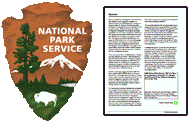United States National Park Service

United States National Park Service: Publications
Date of this Version
2013
Citation
Fisheries Research 144 (2013) 15– 22; http://dx.doi.org/10.1016/j.fishres.2012.09.014
Abstract
The Dry Tortugas Research Natural Area (RNA), a 158-km2 no-fishing, no-anchor marine reserve, was implemented in 2007 in Dry Tortugas National Park (DRTO), Florida to minimize the effects of human activities on marine resources and to enhance the productivity and sustainability of fish populations. The process of establishing the RNA resulted in the development of a Memorandum of Understanding (MOU) between the State of Florida and the National Park Service (NPS). The MOU constitutes a roadmap for the roles and responsibilities for a state and federal partnership, collaborative preparation of a research and monitoring plan, and reporting on the progress implementing the plan and preliminary findings. A science plan was developed in conjunction with marine and fisheries scientists from multiple agencies and non-government organizations to: (1) quantify changes in the abundance and size-structure of exploited fish species within the RNA relative to adjacent areas; (2) monitor the immigration and emigration of targeted species; (3) monitor changes in species composition and catch rates of exploited fish species throughout the surrounding region; (4) evaluate the effects on marine benthic biological communities; (5) assess reproductive potential of exploited fish species by evaluating egg production and larval dispersal; and (6) implement social science studies to evaluate visitor experiences. For each topic, performance measures, essential and supplemental activities, and general study recommendations were developed. The plan supported interagency marine resource managers in the structured implementation of a science program by communicating to the public a suite of performance measures and essential and supplementary studies designed to document changes in fisheries resources. Development of collaborative marine science programs are useful for leveraging resources, engaging the public and agency decision-makers, and long-term planning to ensure that research and monitoring data are available for sustainable adaptive management of marine reserves.


Comments
Published by Elsevier B.V.
U.S. Government Work